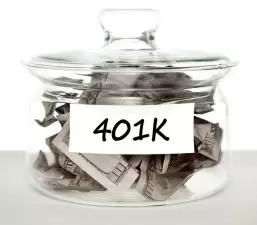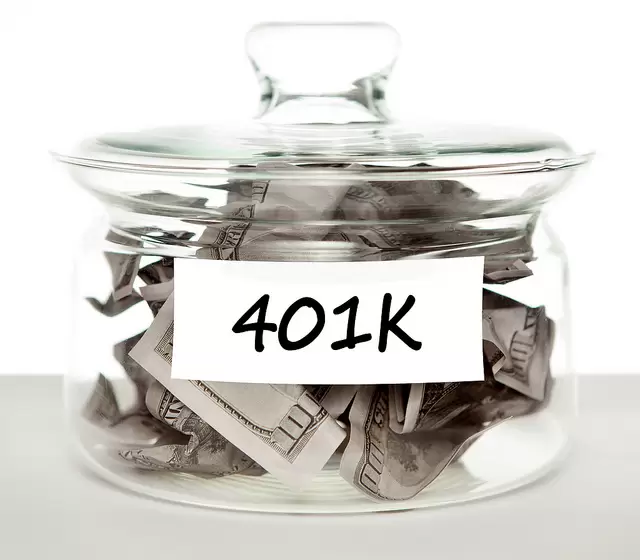I will be closing on my first house on December 4th, and I will be bringing a 20% down payment to my closing date.
As someone who just paid off my student loans a few months ago, I definitely didn’t just have $40k lying around.
What I did have was a fairly substantial amount of money in my 401k. The only problem is an early withdrawal from a 401k means I’d be hit with taxes and penalties. If only there was a way to access the money without paying taxes or penalties…
There is!
A 401k Loan Gives You Access to Your Money
Many companies allow employees to take a loan against the money in their 401k. Note that I said MANY; companies are not required to offer 401k loans and you have to check with your HR office.

If your company does allow a 401k loan, they may let you borrow up to 50% of your vested balance.
The bad news is you will probably have to pay a fee for the loan to be processed (mine was $50) and you will have to pay back the loan with interest (my rate is 4.25%).
The good news is the loan processing fee can be pretty small (I paid $50 on a $15,000 loan, or 0.33%) and the interest you pay goes directly into your 401k account. You are paying interest to yourself!
You can take a 401k loan for any reason but it will have to be paid back within five years. The only exception is if you are using the loan to buy a house, in which case it can be longer (mine is 20 years). I just had to fax them my signed home purchase agreement and they cut a check the very next day.
The Downsides of Taking a 401k Loan
Aside from the minimal fees and interest you pay when you take out a 401k loan, there are two serious issues to consider before deciding to take a 401k loan.
The first negative is the opportunity cost of the loan. If you take out a $15,000 401k loan then you have $15k less in your investments. If your investments go up 10% over the year then your net loss will be 10% minus the interest you are paying on the loan.
There is another side to that coin. If you take out a loan and the stock market drops 10% the you will actually come out 10% better than you would have been if you left it in there.
The other danger of a 401k loan is if you leave your company. If you quit your job then the loan will be due in full in the next 60 days. Whatever you don’t pay back in that time will be counted as an unqualified distribution, which means you’ll pay taxes and a 10% penalty for all the money you borrowed.
If you are thinking about leaving your company in the near future then a 401k loan is a horrible idea.
The Best Thing About My 401k Loan
Personal finance bloggers and even certified financial planners will always talk about diversifying your portfolio. They typically mean having a mixture of different stocks and bonds. US vs. International. Large, Mid, and Small Cap. Dividend vs. Growth. Etc.
However, you aren’t truly diversified if your net worth is 100% in stocks and bonds. Other ways to diversify your net worth include precious metals (like junk silver) and of course real estate.
Before buying this house I was about 93% invested in a combination of the stock market, the bond market, and cash. My other 7% was my junk silver.
Now I’m about 66% in real estate (my house), 29% stocks, bonds, and cash, and 7% precious metals. That’s a much better diversification in my opinion.
As time goes on I will pay back my 401k loan and build up my investments again so my house isn’t such a massive portion of my net worth, but I feel so much more financially secure knowing that I have a house.
Call me crazy, but it scares the crap out of me having almost 100% of my money in the stock market. I like the idea of putting my money into things I can physically touch and/or live inside.
Putting 20% Down Saves Money
Another reason I took the 401k loan was because I wanted to have a 20% down payment. Buying a home is much more expensive if you don’t have 20% down.
- Without 20% down, you’ll need either PMI (which can be well over $100 a month) or a second loan (which will be a much higher rate than the first mortgage).
- The more money you put down the better your interest rate will be, meaning you have a lower monthly payment.
A 401k Loan Might Be Right for You
To summarize, a 401k loan lets you get to the money in your 401k without paying early withdrawal taxes or penalties. There are some fees involved and you risk removing your money from the market when it might go up.
On the other hand, it allows you to diversify your assets into a real estate purchase that is not only a valuable piece of property, but also somewhere you can live.
Readers: Have you ever taken a 401k loan? If so what did you use it for?
Kevin McKee is an entrepreneur, IT guru, and personal finance leader. In addition to his writing, Kevin is the head of IT at Buildingstars, Co-Founder of Padmission, and organizer of Laravel STL. He is also the creator of www.contributetoopensource.com. When he’s not working, Kevin enjoys podcasting about movies and spending time with his wife and four children. Lastly, Kevin holds a B.A. in Mathematics and a B.S. in Electrical Engineering.








In addition to the disadvantages you mentioned, you’re also going to be taxed twice on the same money. Since the money you took out was put into your 401k pretax, you also now have to pay taxes on it in addition to paying interest. It will be considered ordinary income.
When you retire you’ll have to pay taxes again on the same 15k that you put back in.
Let me clarify this a bit. The money in my 401k was put in pre-tax. I DO NOT pay income tax on the amount of the loan.
I DO pay the loan back with after-tax money (unlike contributions which are pretax), which is where I am getting hit with the tax.
I will again be hit with a tax when I take the money out at retirement, which is where the double taxation comes from.
However, it’s important to note that if I were to borrow $15k any other way, I would pay back that loan with after-tax money as well, which is the comparison that makes more sense. If you need to borrow money you’re going to have to pay it back with after-tax money no matter where you get your loan from. In my opinion I may as well borrow from myself so when I’m paying interest I’m paying it to ME.
I think it’s great that you put 20% down on your house, I’m a firm believer in that strategy. However, I can’t say I’m on board with taking out a 401(k) loan to do that. To me, it’s tantamount to those who take home equity loans to fund the purchase of new cars or something like that. 401(k)’s are for retirement and unless it’s an emergency cash need, I just can’t advocate that as a good idea. I would have advocated saving for that 20%. Building wealth and many of the things that go along with it require patience and perseverance.
Either way, best of luck and I look forward to reading as you pay back the loan.
DId you use funds from your ROTH-IRA first? You should ahve been able to access those w/o a fee because you’re a first time home buyer. Im guessing that you did, but the 401k loans are not a bad deal at all.
You don’t have to be “planning” to leave your job for things to work out that way, especially over a five year period. I feel more like you’re trying to justify your decision than advocating this as a great choice. I see our financial goals at odds, so I gotta unsub. I already see too many sad stories at work of situations that didn’t go according to plan and people desperately trying to keep their homes. I truly hope you’re lucky and everything goes as planned, but I recommend you increase your emergency fund drastically, at which point you might as well just pay off the loan.
-Lindsey, Mortgage Modification Underwriter
Another thing to note. If my job fires me then I don’t have to pay it all back immediately. Its only due in 60 days if I voluntarily leave my job.
I agree with Lindsey. It looks like it’s time for me to unsubscribe as well. It appears that we have completely different financial (and life) goals and I don’t agree with yours. I don’t count it as putting a 20% down payment down if you need to take a loan from your 401(k) and empty your Roth IRA.
I do wish you the best of luck with your house and I hope you enjoy it.
Sorry you don’t want to follow my blog anymore. I’m curious what your financial and life goals are that are so different from mine.
Pretty sure you’re taking this a bit far, Leigh. Like Lindsey you chose the dramatic path. Next time, please give a few more days notice and I’ll host your going away party.
Way to be dramatic! Instead of just letting it go and going through with the unsub. you chose to share your “expert” opinion and compare Kevin to the people you encounter at work. Obviously, you haven’t been following this blog for that long as Kevin is in no way on the path to financial ruin.
You have to do what is right for you so don’t let others get you down. That said, this definitely isn’t for everyone. I’ve never done it and hopefully never will. It seems like your job is pretty secure so hopefully you’ll be able to pay the loan back in full before anything happens 🙂
Good luck with the new house and enjoy! I see a lot of new house posts coming up!
Of course this isn’t for everybody. I would’ve done it though if I had the money available. With your track record on your student loans I don’t think you’ll have trouble paying it off. Needless to say, I’d pay this back agressively first! I hated the thought having to pay PMI. If you get an FHA loan then you HAVE to pay PMI for 5 years at least. Even if you somehow get the 20% equity in your home in 2 years. If you get a conventional loan without 20% down you still HAVE to pay PMI for at least 2 years regardless of your equity. When I was prequalified for FHA and conventional without a down payment PMI would’ve been something like $120 – $150! That’s throwing money away. The lender that I spoke with also said that since the ’08 housing crash they don’t do the seperate 20% down loan to avoid PMI. Not sure if this is everywhere or not. Just what she was telling me when I asked about it.
Like Lance said, don’t let everybody get you down. I like that you did this because I’ve never even heard of it. If it doesn’t work out very well you can always blog about it! Warn everybody else! Or you can say how amazing of an idea it was. You live and learn!
Thanks Chris. I’ve gotten some emails from people thanking me for the info as well. Just because this might not be for everyone I think its good for people to know its an option.
Another note: I can’t pay this off in small chunks. I can only make the minimum payments until I’m ready to pay off 100% of the loan
Wow, that sounds like a great option! I mean, I’d love to have a 401K at all, let alone one that has enough money in it that I could borrow from my future self!
A well thought out argument, but not one that i agree with. I believe that owning a house is a great long-term investment. But, I feel strongly that the traditional path where you save up 20% the old fashion way would be the better one – even if it takes a year or two longer.
Not to be rude, but who suggested this move? Was it someone with a conflict of interest?
Good luck with your new home!
I have never taken a 401k (in my case a 403b, since I work for a non-profit) loan. I have had to take a withdrawal from my 401k at my previous job because I was laid off with substantial debt and no emergency savings to carry me through the period of unemployment. Bottom line is I am just now (4 years later) where I was with my retirement savings balance in 2008 and strongly recommend having a healthy emergency use fund to prevent this happening to you!Thomas Nitzsche ClearPoint Credit Counseling Solutions www.clearpointccs.org
Hi Thousandaire:
I haven’t commented for awhile, and I have been reading your 3 most recent posts (and seen some of the negative comments about taking that 401K loan), so I thought I would comment on all three posts here.
1. I would say that making a 20% down payment on a house is a great way to go, because you don’t have to pay mortgage insurance. Additionally, I don’t see a 401K loan as a bad idea (you do take on some risk though – such as job loss, which will require you to pay the loan back in full right now). However, I might question the timing of the loan. Stocks are down… If you took the loan in late September – kudos. If you took it later than that, you may have sold your stocks at a loss depending on when you purchased them. If so, did you calculate this loss in?
2. I agree that income is what is requried at retirement — not necessarly a fat IRA/401K. It is good to diversify income streams, but when it comes to security of that income, I will have to side with long term dividend paying stocks like KO, MCD, KMB and the like over renting single family housing units. You will need about $1.4M or so to ensure $50,000 a year in dividends, but such stocks’ dividend plans often work as inflation hedges, producing more income on a yearly basis. Those who draw down their nest egg (4% rule, ect) are the ones who have to worry about thier bank account giving out before thier heart — dividend investors, not so much.
3. Small businesses and rentals are a good way to get income too, but if you have these, you will never really be retired (if you should ever become a landlord, you will know why). Also, IMHO, the income from a rental is not as secure as KO’s dividend — and in retirement all I have to do to get that dividend is not sell the shares (and prehaps buy a Coke every now and then). To get that rent check I need to have a tennant willing to rent.
4. You are not more diversified with 66% of your net worth in one house than you were when you had 100% of your net worth in stocks (unless you had 66% in one stock — then its tit-for-tat). That is because your house represents one asset (one house) in one asset class (single family housing I would assume) in one geographic area (some place in Texas?). Stocks represent different assets (the company your stock represents) in different industries (consumer discressionary, industrials, ect). To be truely diversified in real estate, you would need properties in different asset classes (single family, multi tenant, commercial, ect) located in many different geographic areas. The easiest way to do this is to purchase shares in REITs. I suggest O and NNN, but many good examples exist. — they also pay dividends.
5. I don’t wish to be too negative though. There is money to be made (although I feel it takes a lot more work then buying the correct type of stocks) in real estate and small business. I would only recommend becoming a landlord to those making AT LEAST $65,000 per year with little to no other debt than the mortgage. Take it from someone who tried the real estate thing with when they only had an income of $48,000 — if you become a landlord on a mortgaged property without significant cash flow (excluding the rent) you are taking on too much risk.
6. All that being said, I am about to become a landlord (for the second time in my life) for the house I currently own. I make a lot more than $48K now, I have a mortgage on the property, but I can pay it off in full if I wish (I would never actually do this because then I wouldn’t be properly diversified — too much of my net worth would be in one asset) and if I keep the mortgage, I can still make the required payment each month even if the property goes unrented forever — based on the cash flow from my job — no renter needed. For my own self, only when those two conditions are met is the risk of becoming a landlord worth it. There are still many legal risks to consider — like what happens if your tenant lets a friend drive home drunk after a party at your house, and the friend kills someone… better spell that out in your lease agreement.
7. The house I actually live in is not mine — I happly rent it.
8. I guess what I am trying to say is, take it slow Thousandaire… you WILL become a millionaire if you are dilligent (almost any American can do it). Just don’t jeopardize it by taking on too many unnecessary risks.